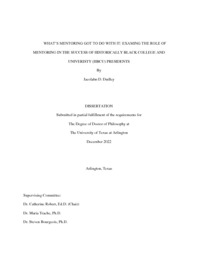
ATTENTION: The works hosted here are being migrated to a new repository that will consolidate resources, improve discoverability, and better show UTA's research impact on the global community. We will update authors as the migration progresses. Please see MavMatrix for more information.
Show simple item record
| dc.contributor.advisor | Robert, Catherine | |
| dc.creator | Dudley, Jacolahn Deshawn | |
| dc.date.accessioned | 2023-01-26T16:13:59Z | |
| dc.date.available | 2023-01-26T16:13:59Z | |
| dc.date.created | 2022-12 | |
| dc.date.issued | 2022-12-19 | |
| dc.date.submitted | December 2022 | |
| dc.identifier.uri | http://hdl.handle.net/10106/31013 | |
| dc.description.abstract | Over the years there has been an increase in the turnover of Historically Black College and University (HBCU) presidents. As the turnover rates at HBCUs continues to increase, many higher education researchers have noted that HBCUs are currently being plagued by a leadership crisis (Evans et al., 2002; Freeman & Palmer, 2020; Kimbrough, 2017). Despite heavy criticism by media and academic researchers, very few recommendations have been made in regard to combating the “leadership crisis” at HBCUs. Of the studies conducted, researchers have recommended that one way to counter the rapid turnover of HBCU presidents is by engaging in some form of mentoring relationship. While previous studies have examined the role mentoring plays in the success of aspiring HBCU presidents, there is currently a gap in literature regarding the positive effects mentoring has in the successful tenure of HBCU presidents. Thus, this phenomenological study examined the lived experiences of six current and former HBCU presidents and their perceptions of mentoring in their success. This study used Kram’s (1983) Phases of Mentor Relationships theory and DeRue, Spreitzer, Flannagan, and Allen's (2013) Mindful Engagement conceptual framework to guide this study. There were six significant findings that were discovered through this study: 1) the art of mentoring development, 2) life never goes as planned, 3) advancing HBCUs, 4) I didn’t get here alone, 5) tools for success, and 6) passing the baton. The findings from the study support previous literature by researchers regarding the significant role mentoring plays in the success of HBCU presidents. Overall, study participants credited mentoring relationships in addition to certain professional skills and characteristics to their success as HBCU presidents. | |
| dc.format.mimetype | application/pdf | |
| dc.language.iso | en_US | |
| dc.subject | HBCU | |
| dc.subject | Mentoring | |
| dc.title | WHAT’S MENTORING GOT TO DO WITH IT: EXAMINING THE ROLE OF MENTORING IN THE SUCCESS OF HISTORICALLY BLACK COLLEGE AND UNVIERSITY (HBCU) PRESIDENTS | |
| dc.type | Thesis | |
| dc.date.updated | 2023-01-26T16:13:59Z | |
| thesis.degree.department | Educational Leadership and Policy Studies | |
| thesis.degree.grantor | The University of Texas at Arlington | |
| thesis.degree.level | Doctoral | |
| thesis.degree.name | Doctor of Philosophy in Educational Leadership and Policy Studies | |
| dc.type.material | text | |
Files in this item
- Name:
- DUDLEY-DISSERTATION-2022.pdf
- Size:
- 1.397Mb
- Format:
- PDF
This item appears in the following Collection(s)
Show simple item record


